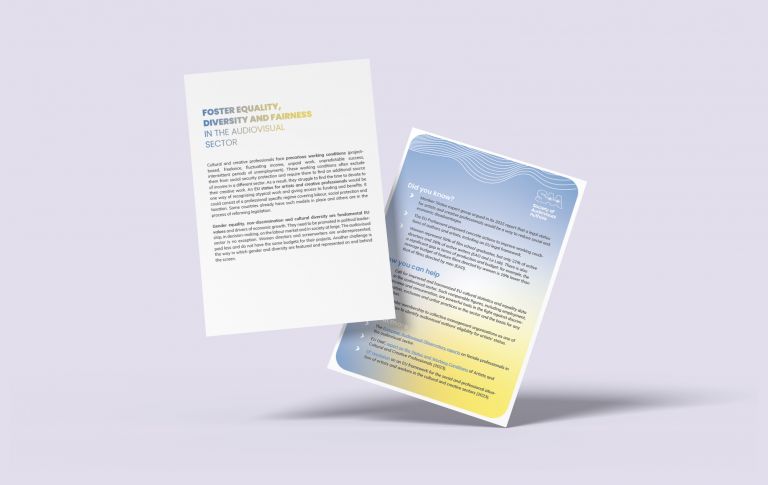Foster Equality, Diversity and Fairness in the Audiovisual Sector

Cultural and creative professionals face precarious working conditions (projectbased,
freelance, fluctuating income, unpaid work, unpredictable success, intermittent periods of unemployment). These working conditions often exclude them from social security protection and require them to find an additional source of income in a different sector. As a result, they struggle to find the time to devote to their creative work. An EU status for artists and creative professionals would be one way of recognising atypical work and giving access to funding and benefits. It could consist of a professional specific regime covering labour, social protection and taxation. Some countries already have such models in place and others are in the process of reforming legislation.
Gender equality, non-discrimination and cultural diversity are fundamental EU values and drivers of economic growth. They need to be promoted in political leadership, in decision-making, on the labour market and in society at large. The audiovisual sector is no exception. Women directors and screenwriters are underrepresented, paid less and do not have the same budgets for their projects. Another challenge is the way in which gender and diversity are featured and represented on and behind the screen.
Did you know?
- Member States expert group argued in its 2023 report that a legal status for artists and creative professionals would be a way to reduce social and economic disadvantages.
- The EU Parliament proposed concrete actions to improve working conditions of authors and artists, including an EU legal framework.
- Women represent 50% of film school graduates, but only 22% of active directors and 36% of active writers (EAO and Le Lab). There is also a significant gap in terms of production and budget: for example, the average budget of feature films directed by women is 19% lower than that of films directed by men (EAO).
How you can help
- Call for improved and harmonised EU cultural statistics and equality data in the audiovisual sector. Such comparable figures, including employment, income and remuneration, are powerful tools in the fight against discrimination, exclusion and unfair practices in the sector and the basis for any action.
- Consider membership to collective management organisations as one of the ways to identify audiovisual authors’ eligibility for artists’ status.
Find out more
- The European Audiovisual Observatory reports on female professionals in the audiovisual sector.
- EU OMC report on the Status and Working Conditions of Artists and Cultural and Creative Professionals (2023).
- EP resolution on an EU framework for the social and professional situation of artists and workers in the cultural and creative sectors (2023).
